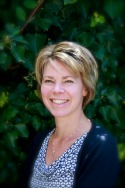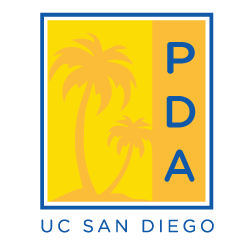
Nina M. van Sorge, Ph.D.
Associate Professor, Department of Medical Microbiology | University Medical Center Utrecht, The Netherlands

- Interview
Interview
Interview by: Alexandra Bortnick
Interview: December 2015
Transition: December 2013
1. Please list your previous department at UC San Diego and provide a brief description of the research you conducted?
I was a postdoc in the lab of Kelly Doran and Victor Nizet in the Department of Pediatrics. I studied virulence mechanisms of Gram-positive bacterial pathogens, specifically how they cause severe invasive disease such as meningitis, sepsis and necrotizing fasciitis.
2. Please describe your current job profile?
I am currently an Associate Professor, running my own research group on Bacterial Glycobiology at the University Medical Center Utrecht, Department of Medical Microbiology, The Netherlands. Currently, my group consists of 3 PhD students, 2 Master’s students, and a visiting student from Italy, who study the role of bacterial glycosylation in pathogenesis. Much of my time goes to supervising my students, grant writing, maintaining and setting up collaborations and writing papers. I spend approximately 10% of my time on teaching activities for Bachelor and Master’s students.
3. What made you decide to transition into your current position?
I always aspired to an academic research career. After my five-year postdoc in San Diego (2007-2011), I moved back to my native country the Netherlands on a Marie-Curie Fellowship from the European Framework Program 7. During these two years of funding, I was able to secure a large personal grant (VIDI grant) that enabled me to start my research group and also secured my position as Assistant Professor within the Department. Through additional funding from an Aspasia grant, I was promoted to Associate Professor shortly after. This position enables me to execute many of the research plans that I have had for years.
4. Apart from the research you conducted, do you feel like anything in particular has helped you acquire your current position?
My time abroad (i.e., at UC San Diego) has definitely helped me prepare for this job. I learned a lot from both my supervisors with regard to writing papers, selling the story, but also how to initiate and maintain collaborations, which is crucial in science nowadays. Also, they were always very generous in sharing knowledge/reagents with other labs rather than overly protective. I experienced first hand how stimulating and productive this approach is, and I intend to run my lab the same way. Finally, both supervisors were great mentors. They listened to the career aspirations of their personnel and tried to prepare them in the best way possible to realize their ambitions (also outside academia!).
5. Please list some of the most striking similarities and differences between your postdoc and current position?
Similarities: Always more to do than can be done; writing papers and grants, attending meetings.
Differences: Supervision of PhD students, organization of (international) meetings/conferences, hosting speakers, writing letters of recommendation, responsibility!
6. Is there any specific challenge (during the entire process of transitioning) that you would like to highlight and, if so, how did you overcome it?
The biggest transition for me has been the supervision part. I am learning on the job. Every student is different, requiring a different approach with regard to motivation and supervision. It is difficult to combine the supervision with the other work that is also expected from you. Also, you need to transition from an experimental detail level to a helicopter view, which also takes time.
7. Please describe your goals and ambitions for the next 5 years?
Make sure that my students graduate with their PhDs to the best of their abilities. Also, prepare them in the best possible way for the next step in their career, whatever they aspire. Maintain current collaborations with other researchers in the field, possibly consolidating this through a consortium-type grant. Pursue additional personal funding to ensure continuation of my research after the PhD students have finished (in 2018).
8. What do you feel you could have done more, as a postdoc, to help prepare you for or acquire your current position?
Attend courses on management and supervision. That is really the biggest difference for me in the transition from Postdoc to Associate Professor. You are trained for years in research and experiments, but not at all at managing personnel.
9. What do you feel is the most important advice you can give to a current UCSD postdoc in order for them to obtain a position such as yours?
Be persistent, flexible and focused. There are many opportunities to start your own lab, but they almost always require that your obtain funding. Most likely, you will not immediately get the first grant you apply for, so be persistent and keep going. Alternatively, a position may open up at a university at the other side of the country. If you really want this career, you need to be flexible enough to move. Finally, in the first couple of years, the most important output are your papers and carving out your niche. Therefore, I would advise postdocs to focus your research initially around things you are an expert but find new twists that separate you from your former supervisor. Establish yourself first before expanding your research and taking risks.
